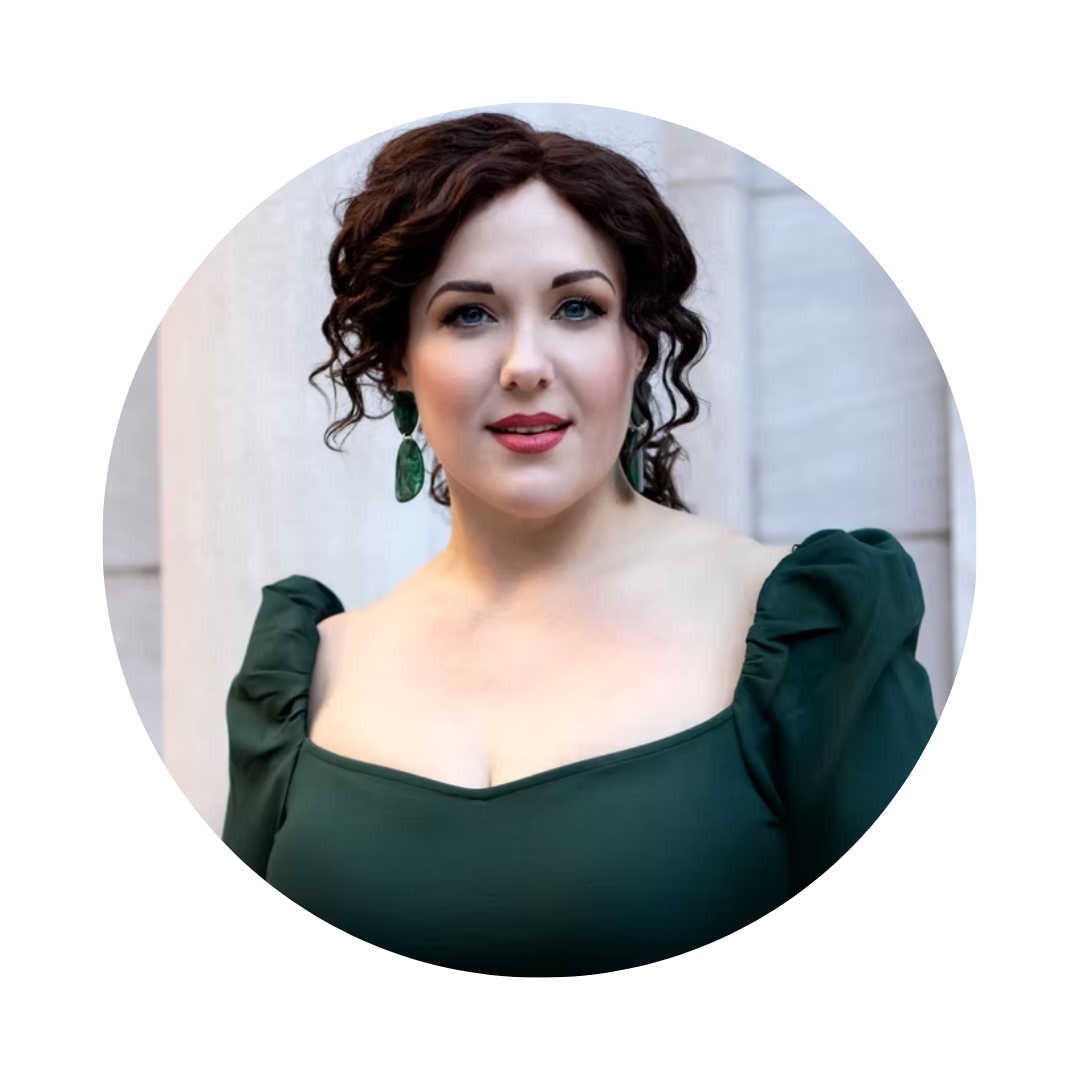Messiah
Rossen Milanov, conductor
Toni Marie Palmertree, soprano
Rosamund Dyer, mezzo soprano
Lwazi Hlati, tenor
Eric Delagrange, bass
Columbus Symphony Chorus
Stephen Caracciolo, Chorus Director
This concert and continued support for the Columbus Symphony Chorus is made possible by longtime friend and benefactor of the Columbus Symphony Anne H. Melvin.
| • • • • • • • • • • • • • • • • • • • • • • • • • • • • • • | ||
| HANDEL (Arr. Mozart) | Messiah 1. Comfort Ye | |
INTERMISSION | ||
Part II 20. Behold the Lamb of God 43. I know that my Redeemer | ||
Toni Marie Palmertree

Soprano Toni Marie Palmertree has become recognized as one of America’s most riveting performers of Puccini and Verdi heroines. She has recently been heard on the stage of San Francisco Opera in the title role of Madama Butterfly; of her performance, Janos Gereben from San Francisco Classical Voice wrote: “The young soprano not only met the challenge, but she claimed her place among the finest vocal interpreters of the role heard here recently.” Other roles at San Francisco Opera include Nedda in I Pagliacci and Liù in Turandot. She also made her Lyric Opera of Chicago debut during the 2019-20 season, stepping into the title role of Luisa Miller for an indisposed colleague.
Planned engagements for the 2025-2026 season include a recital for Gradus ad Parnassum, a Valentine’s Day Concert with the Reading Symphony Orchestra, and a return to The Metropolitan Opera to cover Cio-Cio San in Madama Butterfly. Ms. Palmertree’s 2024-2025 season included covering Tosca with The Metropolitan Opera and singing the same role with the Princeton Festival, performing Mimi in La bohème with OperaDelaware and Opera Baltimore, and covering Amelia in Un ballo in maschera with San Francisco Opera. Ms. Palmertree also participated in a number of recitals and programs with OperaDelaware throughout that season as one of their inaugural Company Artists, a vital part of an innovative and groundbreaking pilot program aimed at transforming the traditional employment model for artists and freelancers in the performing arts industry.
Engagements during the 2023-2024 season included Cio-Cio-San in Madama Butterfly with both West Bay Opera and with Lakeland Opera and an Arizona Opera house and role debut as Donna Elvira in Don Giovanni. The previous season, Palmertree sang the role of Cio-Cio-San in Madama Butterfly at Palm Beach Opera and the title role of Tosca at Florida Grand Opera. At the Metropolitan Opera, she performed the role of Voce dal cielo (house debut) and covered the roles of Elisabeth de Valois in Verdi’s Don Carlo and the title role of Cherubini’s Medea (which she would go on to cover for the Canadian Opera Company, as well). Further recent performances included Contessa Almaviva in Le Nozze di Figaro with OperaDelaware, Nedda in I Pagliacci in her return to Festival Opera New Zealand, Carmina Burana with Fort Wayne Philharmonic, and Beethoven’s Symphony No. 9 with Reno Philharmonic.
Toni Marie is a recipient of the The Richard F. Gold Career Grant by the Shoshana Foundation. She is proud to hold many awards including winner of The Metropolitan Opera National Council District Awards, finalist in The International Moniuszko Voice Competition, and The Classical Singer Voice Competition. She took First Place in the Long Leaf Opera of North Carolina Voice Competition, The Kennett Square Symphony Voice Competition, and The Marcella Sembrich Competition. She was awarded Third Place in the National Opera Association Voice Competition and the James Parkinson Opera Competition and was second place winner of the Sylvia Green Voice Competition. Toni Marie is a graduate of the Adler Fellowship Program at San Francisco Opera.
Rosamund Dyer

Hailing from Bellingham Washington, mezzo-soprano Rosamund Dyer has been described as a “powerhouse” possessing “beauty and depth.” Rosamund received a Bachelor of Music in Vocal Performance, graduating with highest honors from the Oberlin Conservatory of Music and was welcomed by the National Music Honor Society as a Pi Kappa Lambda Scholar. At Oberlin, Rosamund’s vivid expressivity shone in Mendelssohn’s Elijah, Handel’s Messiah, and as Dorabella in Mozart’s Così fan tutte.
Upon graduation, Rosamund moved to New York City and assisted Carnegie Hall, the American Opera Projects, Heartbeat Opera, and the Beth Morrison Projects to nurture emerging composers and librettists in the creation of meaningful contemporary opera.
Rosamund is currently deeply immersed in the rich classical community of the Pacific Northwest. She was the 2024-2025 Studio Artist with Pacific Northwest Opera, performing in the chorus and covering Dame Quickly (Falstaff), Ježibaba (Rusalka), and Foreign Princess (Rusalka). Rosamund made her debut as Alise (Lucia di Lammermoor) with SkyOpera, and Nourabad (Les Pêcheurs de Perles) with Puget Sound Concert Opera, and was awarded Third (2024) and Second (2025) place in the Seattle Opera Guild’s Annual Singers’ Development Competition. Rosamund has been a soloist with the Bellingham Chamber Chorale in Handel’s Messiah and sang the baritone solos in their reimagined Fauré’s Requiem.
This past spring, Rosamund performed as the Third Little Pig (Who’s Afraid of the Big, Bad Wolf?) with Chautauqua Institution’s Opera in the Schools program, and will be returning this summer as a Young Artist for Chautauqua Opera Company performing as Mrs. McNeil (Ida by Lamplight), as Mrs. Baron alongside soprano Christine Georke in composer Missy Mazzoli and librettist Royce Vavrek’s newest opera commissioned by The Metropolitan Opera, Lincoln in the Bardo. She will also be featured as the mezzo-soprano soloist in Gustav Mahler’s Symphony No. 2 with the Chautauqua Symphony Orchestra and the Buffalo Philharmonic Chorus.
A passionate recitalist, Rosamund has curated and produced five individual recitals. Her focus is to create a narrative that leaves the listener transfigured through the pairings of traditional, contemporary, and obscure treasures. Rosamund has studied with Marilyn Horne, Timothy
LeFebvre and is currently studying with Metropolitan Opera Baritone, Erich Parce.
Lwazi Hlati

Lwazi Hlati is a lyric tenor from Johannesburg, South Africa, and one of the most sought-after voices of his generation. He holds a BA in Vocal Arts from the Tshwane University of Technology (TUT) and an MM degree and Performer’s Diploma from Southern Methodist University’s Meadows School of the Arts. He completed a Graduate Artist Certificate in Opera Performance at the University of North Texas and began his Doctor of Musical Arts in Vocal Performance at the University of Southern California in the fall of 2025.
Mr. Hlati is the recipient of numerous honors including the Artistic Merit Award from Meadows School of the Arts, the Bruce R. Foote Memorial Award, support from the Oppenheimer Memorial Trust and SAMRO, and the Artist Merit Award from the South African National Arts Council. He earned First Place for Best Art Song Presentation at the 2023 Duncan Williams Voice Competition (New York City Opera & Manhattan School of Music), and First Place in the 2024 American Opera Idol Competition in Connecticut.
Hlati has earned acclaim for a wide range of operatic roles. Notable appearances include Don José in Carmen (Opera North), Edgardo in Lucia di Lammermoor (Opera in the Ozarks), and Miguel in Offenbach’s Pépito (The Dallas Opera). With Fort Worth Opera, he sang Gastone in La Traviata, the Witch in Hansel and Gretel, King Kaspar in Amahl and the Night Visitors, and appeared in Porgy and Bess. Other highlights include Ferrando in Così fan tutte, Fenton in Falstaff, Prunier in La rondine, and Mitch in A Streetcar Named Desire, as well as concert appearances across Africa and Greece.
He recently participated in a workshop of Lincoln in the Bardo, a new opera by Missy Mazzoli commissioned by the Metropolitan Opera. His concert appearances includes Saviour: A Modern Oratorio Concert at Birchman Baptist Church in Fort Worth and the American Opera Idol Winner Concert in Connecticut, hosted by the Farmington Valley and Hartford Chapters of The Links, Incorporated. Upcoming engagements include the role of Rodolfo in Puccini’s La bohème with Chautauqua Opera.
Eric Delagrange

Eric Delagrange is a highly regarded American bass, celebrated for his powerful vocal presence and impressive stage performances. A distinguished graduate of the prestigious Academy of Vocal Arts, Delagrange has garnered critical acclaim, with Opera News describing him as “a truly excellent bass” and Parterre highlighting his “commanding and powerful voice.”
In the 2024-2025 season, Delagrange will showcase his versatility with several notable role debuts. He will take on the role of Angelotti in Tosca with The Princeton Festival, make his house debut as Superintendent Budd in Albert Herring with Opera Baltimore, debut as William Jennings Bryan in The Ballad of Baby Doe with Western Plains Opera, and portray the Commedatore in Don Giovanni as a guest artist with Temple University.
Delagrange’s past performances include notable roles such as Sarastro in Die Zauberflöte with Ópera Nacional de Chile, Pistola in Falstaff and the Imperial Commissioner in Madama Butterfly with Palm Beach Opera, Basilio in Il barbiere di Siviglia with The Princeton Festival, Frère Laurent in Roméo et Juliette with Opera San José, the Hermit in Der Freischütz with Heartbeat Opera, and Prince Gremin in Eugene Onegin with the Music Academy of the West
Columbus Symphony Chorus
SOPRANO
Susie Beecroft
Laura Byars
Andrea Dent
Katie DiPietro
Kathryn Ehle
Karissa Frische
Charlotte Geary
Cassie Howard
Makenna Koehl
Alexa Konstantinos
Miriam Matteson
Maureen O’Brien
Amy Adele Parker
Stephanie Pikovnik
Stephanie Rodriguez
Kristen Snyder
Chelsea Winebrener
Victoria Zanatian
ALTO
Aubrey Bailey
Amy Bergandine
Deborah Forsblom
Savannah Gonsoulin
Lauren Grangaard
Kirby Johnson
Elizabeth Murphy
Elizabeth Pittman
Christina Rossi
Hannah Miller Rowlands
Heather Rudisill
Gretchen Rutz Leist
Jenna Shively
Katerina Warner
Peggy Wigglesworth
TENOR
Wade Barnes
Justin Burkholder
Michael Cochran
Daniel Davis
Geoffrey Gear
Aaron Lashley
Darius McBride
Adam Mesker
Matt Pittman
Richard Spires
Andrew Sutherland
Eric White
Michael Wigglesworth
Thom Wyatt
Jason Yoder
Aidan Young
BASS
Alexander Almeida
Matthew Barbour
Kevin Baum
Raymond Cho
Jacob Conrad
Luis Danyel Falcon
Keith Frische
William Gehring
Eric Gibson
Andrew Grega
Kent Maynard
Robert Moreen
Kyle Norton
David Scott
Dominic Straquadine
DIRECTOR
Stephen Caracciolo
ACCOMPANIST
Casey Cook
BOARD CHAIR
William Gehring
CSO CHORUS COORDINATOR
Lauren Grangaard
Messiah (1741)
by George Frideric Handel (Halle, Saxony, 1685 - London, 1759)
revised and re-orchestrated in 1789 by Wolfgang Amadè Mozart (Salzburg, 1756 - Vienna, 1791), K. 572
Handel’s Messiah was forty-eight years old when Mozart arranged it for performances in Vienna. By this time–30 years after Handel’s death–the oratorio had become a regular part of the choral repertoire in England, not only in London but in many other cities as well. The work had also begun to make inroads internationally, and performances–partial or complete–were given in Florence, Hamburg, Mannheim, Berlin and even New York in the 1770s and ‘80s.
Audiences everywhere admired the unique power of this piece which, unlike the other Handel oratorios, did not dramatize one particular Biblical or mythological story but proposed, instead, a commentary of the life of Christ, from birth to death and resurrection. This was realized through a brilliant collage of Bible verses, expertly assembled by Handel’s friend Charles Jennens. The first performance of Messiah took place in Dublin on April 13, 1742, and the work was immediately recognized as a masterpiece.
The credit for bringing Messiah to Vienna belongs to Baron Gottfried van Swieten, a Dutch-born diplomat who served as the Austrian Ambassador to Prussia from 1770 to 1777. Van Swieten later became the imperial librarian in Vienna, where he was responsible for the world’s first card catalog, and also held a position in government that today would be called Minister of Culture. He was also a prolific amateur composer. In the 1790s, he helped write the librettos for Haydn’s oratorios The Creation and The Seasons, and was one of the young Beethoven’s patrons (Beethoven dedicated his First Symphony to him).
During his time in Berlin, van Swieten became acquainted with Carl Philipp Emanuel Bach, Johann Sebastian Bach’s second-oldest son and a great composer in his own right. Through him, he discovered the music of J. S. Bach and Handel, and, after his return to Vienna, he devoted himself to making their work known in the Imperial capital.
The diplomat first met Mozart when the latter, as a 11-year-old child prodigy, was making his debut in Vienna. Their paths crossed again when Mozart moved to Vienna in 1781; he soon became a regular at van Swieten’s musical salons where, as he reported to his father, “nothing [was] played but Handel and Bach.”
In 1788, van Swieten decided to put on entire Handel oratorios in Vienna and enlisted Mozart’s help in preparing those performances. Between 1788 and 1790, Mozart made new performing versions of four oratorios: Acis and Galatea, Messiah, Ode for St. Cecilia’s Day, and Alexander’s Feast. Der Messias, as it was called on this occasion, was sung in German and given on March 6 and April 7, 1789 at the Viennese palace of Count Johann (János) Esterházy. (Additional performances of this version followed in the 1790s, after Mozart’s death.) According to contemporary accounts, Mozart conducted the instrumentalists, and Ignaz Umlauf (1746-96) the singers. The soprano soloist was none other than Aloysia Lange, née Weber, Mozart’s former great love and now his sister-in-law; the tenor was Valentin Adamberger, the first Belmonte in The Abduction from the Seraglio. The solo quartet was rounded out by the gifted amateur Katharina Altomonte, and Ignaz Saal, a prominent member of the Imperial theater.
To accommodate Viennese musical tastes, Mozart enlarged the orchestration, made a few cuts and other alterations, and added copious dynamic markings, which Baroque composers rarely included in their scores. These editorial actions speak volumes about the way musical tastes, and the treatment of the instruments, had changed since Handel’s time. The woodwinds were emerging as equal members of the orchestra alongside the strings. Mozart was particularly fond of the clarinet, still a newcomer in orchestras at the time, and added its special timbre to the score of Messiah as well. In addition, he dispensed with the organ (which was not available at Count Esterházy’s residence), and used a harpsichord to accompany the recitatives.
Mozart used the flutes, oboes, clarinets, bassoons and horns in many different configurations across the monumental work, like a painter who mixes colors on the canvas with the greatest subtlety and sophistication. The wind instruments are frequently given small, but very audible and significant solos. Their contributions sometimes amount to veritable commentaries on the original. For instance, in the chorus “And we, like sheep,” their repeated rapid eighth-notes seem to represent the running animals, as Andreas Holschneider, who edited the work for the new complete edition of Mozart’s works, remarked in his introduction. (This may have had something to do with the influence of van Swieten who, ten years later, inspired other instances of “tone-painting” in Haydn’s Creation and Seasons.)
Among Mozart’s special orchestration choices, we may mention the two solo violas in the duet “O Death, where is thy sting,” and the piccolo part in the “Pifa” (“Pastoral Symphony”). Mozart used the piccolo on only one other occasion in his life, in the storm scene of the 1781 opera Idomeneo. Trumpets and timpani appear in only a few movements in Der Messias where the character of the music called for them (“Glory to God,” “Why do the nations,” “Hallelujah,” and “Worthy is the Lamb”). The three trombones may be heard in just a handful of brief passages (in the orchestral introduction, and in “Since by man came death”).
Most conspicuously, Mozart replaced Handel’s trumpet solo in “The trumpet shall sound” by a solo horn. This was mainly because the special Baroque trumpet technique, using the high register of the instrument, had become obsolete by the 1780s. Also, in the German translation in which the piece was performed, the instrument that announces the Last Judgment is not the trumpet but the trombone (Posaune), though Mozart evidently didn’t find it practical to give the solo to that instrument. (It was only in the Requiem, written three years later, that he used a trombone to represent the Tuba mirum spargens sonum.)
Mozart left Handel’s vocal lines largely untouched. Occasionally, though, he reassigned an aria to a different singer, as in “Rejoice greatly,” originally for soprano, but sung here by the tenor. A sequence of numbers in Part II beginning with “All they that see Him,” originally for tenor, is now divided by the soprano and the alto (called Soprano II in the score). These decisions probably had to do with the desires and preferences of the Viennese singers. In another change that shows the hand of Mozart the dramatist, some choral passages were given to the solo quartet rather than the entire chorus. Several movements begin with the soloists and the entire ensemble would join in later, providing a striking dynamic contrast. Handel never used the quartet of soloists in this way; however, he sometimes did something similar with his string section, having them start senza ripieno (soloists only) before the rest of the players entered. This practice came from the concerto grosso genre, of which Handel was of course a great master. It is interesting that Mozart transferred this idea from the instruments to the voices.
Mozart did compose one original movement for Der Messias: he replaced Handel’s soprano aria “If God be for us” by a brand-new accompanied recitative, also for soprano. This must have been at the express request of van Swieten, who, for whatever reason, found this aria “cold,” as he told Mozart in a letter. Here Mozart briefly allowed himself to speak in his own voice, replacing the quiet confidence of Handel’s aria with a more philosophical meditation on the redemption of humankind.
Mozart’s intense involvement with Handel’s music could not fail to influence his own compositional work during the last years of his life. He may have remembered the D-minor fury of the bass aria “But who may abide,” with its abundant coloratura, when he wrote the Queen of the Night’s second aria in The Magic Flute (where the coloratura is heard a couple octaves higher.) And while the Kyrie fugue in the Requiem is based on a subject that is familiar from many Baroque compositions, “And with his stripes” may have provided an immediate model as a choral fugue on the famous theme.
Notes by Peter Laki
Texts
PART I
Sinfonia
Accompagnato (Tenor)
Comfort ye, comfort ye my People, saith your God; speak ye comfortably to Jerusalem, and cry unto her, that her Warfare is accomplish’d, that her Iniquity is pardon’d. The Voice of him that crieth in the Wilderness, prepare ye the Way of the Lord, make straight in the Desert a Highway for our God.
(Isaiah 40:1-3)
Air (Tenor)
Ev'ry valley shall be exalted, and ev’ry Mountain and Hill made low, the Crooked straight, and the rough places plain.
(Isaiah 40:4)
Chorus
And the glory of the Lord shall be revealed, and all Flesh shall see it together; for the Mouth of the Lord hath spoken it.
(Isaiah 40:5)
Accompagnato (Bass)
Thus saith the Lord of Hosts; Yet once a little while, and I will shake the Heav’ns and the Earth; the Sea and the dry Land: and I will shake all Nations: and the Desire of all Nations shall come.
(Haggai 2:6-7)
The Lord whom ye seek shall suddenly come to his Temple, ev’n the Messenger of the Covenant, whom ye delight in: Behold He shall come, saith the Lord of Hosts.
(Malachi 3:1)
Air (Bass)
But who may abide the day of his coming? And who shall stand when He appeareth? For He is like a Refiner’s Fire.
(Malachi 3:2)
Chorus
And he shall purify the Sons of Levi, that they may offer unto the Lord an Offering in Righteousness.
(Malachi 3:3)
Recitative (Alto)
Behold, a virgin shall conceive, and bear a Son, and shall call his Name Emmanuel, God with us.
(Isaiah 7:14; Matthew 1:23)
Air (Alto) and Chorus
O thou that tellest good Tidings to Zion, get thee up into the high Mountain: O thou that tellest good tidings to Jerusalem, lift up thy Voice with Strength: lift it up, be not afraid. Say unto the Cities of Judah, Behold your God. O thou that tellest good Tidings to Zion, arise, shine, for thy Light is come, and the Glory of the Lord is risen upon thee.
(Isaiah 40:9; Isaiah 60:1)
Accompagnato (Bass)
For behold, Darkness shall cover the Earth, and gross Darkness the People: but the Lord shall arise upon thee, and his Glory shall be seen upon thee. And the Gentiles shall come to thy Light, and Kings to the Brightness of thy Rising.
(Isaiah 60:2-3)
Air (Bass)
The people that walked in Darkness have seen a great Light; and they that dwell in the Land of the Shadow of Death, upon them hath the Light shined.
(Isaiah 9:2)
Chorus
For unto us a Child is born, unto us a Son is given; and the Government shall be upon his Shoulder; and His Name shall be called Wonderful, Counsellor, The Mighty God, The Everlasting Father, The Prince of Peace.
(Isaiah 9:6)
Pifa (Pastoral Symphony)
Recitative (Soprano)
There were Shepherds abiding in the Field, keeping Watch over their Flock by Night.
(Luke 2:8)
Accompagnato (Soprano)
And lo, the Angel of the Lord came upon them, and the Glory of the Lord shone round about them, and they were sore afraid.
(Luke 2:9)
Recitative (Soprano)
And the angel said unto them, Fear not; for behold, I bring you good Tidings of great Joy, which shall be to all People. For unto you is born this Day, in the City of David, a Saviour, which is Christ the Lord.
(Luke 2:10-11)
Accompagnato (Soprano)
And suddenly there was with the Angel a Multitude of the heav’nly Host, praising God, and saying:
(Luke 2:13)
Chorus
Glory to God in the Highest, and Peace on Earth, Good Will towards Men.
(Luke 2:14)
Air (Tenor)
Rejoice greatly, O Daughter of Zion, O Daughter of Jerusalem; behold, thy King cometh unto thee: He is the righteous Saviour; and He shall speak Peace unto the Heathen.
(Zechariah 9:9-10)
Recitative (Soprano)
Then shall the Eyes of the Blind be open’d, and the Ears of the Deaf unstopped; then shall the lame Man leap as a Hart, and the Tongue of the Dumb shall sing.
(Zechariah 35:5-6)
Air (Soprano)
He shall feed his Flock like a Shepherd: and He shall gather the Lambs with His Arm, and carry them in his Bosom, and gently lead those that are with young. Come unto Him all ye that labour, come unto Him all ye that are heavy laden, and He will give you Rest. Take his Yoke upon you and learn of Him; for He is meek and lowly of Heart: and ye shall find Rest unto your souls.
(Isaiah 40:11; Matthew 11:28-29)
Chorus
His Yoke is easy, his Burthen is light.
(Matthew 11:30)
Part II
Chorus
Behold the Lamb of God, that taketh away the Sin of the World.
(John 1:29)
Air (Alto)
He was despised and rejected of Men, a Man of Sorrows, and acquainted with Grief.
(Isaiah 53:3)
He gave his Back to the Smiters, and his Cheeks to them that plucked off the Hair: He did not hide his Face from Shame and Spitting.
(Isaiah 50:6)
Chorus
Surely he hath borne our Griefs and carried our Sorrows: He was wounded for our Transgressions, He was bruised for our Iniquities; the Chastisement of our Peace was upon Him.
(Isaiah 53:4-5)
Chorus
And with His Stripes we are healed.
(Isaiah 53:5)
Chorus
All we, like Sheep, have gone astray, and we have turn’d ev’ry one to his own Way, and the Lord hath laid on Him the Iniquity of us all.
(Isaiah 53:6)
Accompagnato (Soprano)
All they that see Him laugh Him to scorn; they shoot out their Lips, and shake their Heads, saying:
(Psalms 22:7)
Chorus
He trusted in God, that He would deliver Him; let Him deliver Him, if He delight in Him.
(Psalms 22:8)
Accompagnato (Soprano)
Thy Rebuke hath broken His heart; He is full of Heaviness: He looked for some to have Pity on Him, but there was no Man, neither found He any to comfort Him.
(Psalms 69:21)
Arioso (Soprano)
Behold, and see, if there be any Sorrow like unto His Sorrow!
(Lamentations 1:12)
Accompagnato (Soprano)
He was cut off out of the Land of the Living: For the Transgression of thy People was He stricken.
(Isaiah 53:8)
Air (Soprano)
But thou didst not leave His soul in Hell, nor didst Thou suffer Thy Holy One to see Corruption.
(Psalms 16:10)
Chorus
Lift up your heads, O ye Gates, and be ye lift up, ye everlasting Doors, and the King of Glory shall come in. Who is this King of Glory? The Lord Strong and Mighty; the Lord Mighty in Battle. Lift up your heads, O ye Gates, and be ye lift up, ye everlasting Doors, and the King of Glory shall come in. Who is this King of Glory? The Lord of Hosts: he is the King of Glory.
(Psalms 24:7-10)
Recitative (Soprano)
Unto which of the Angels said He at any time, Thou art my Son, this Day have I begotten thee?
(Hebrews 1:5)
Chorus
The Lord gave the Word: Great was the Company of the Preachers.
(Psalms 68:11)
Air (Soprano)
How beautiful are the Feet of them that preach the Gospel of Peace, and bring glad Tidings of good Things.
(Romans 10:15)
Chorus
Their Sound is gone out into all Lands, and their Words unto the Ends of the World.
(Romans 10:18)
Air (Bass)
Why do the Nations so furiously rage together? And why do the People imagine a vain Thing? The Kings of the Earth rise up, and the Rulers take Counsel together against the Lord and against his Anointed.
(Psalms 2:1-2)
Chorus
Let us break their Bonds asunder, and cast away their Yokes from us.
(Psalms 2:3)
Recitative (Tenor)
He that dwelleth in Heaven shall laugh them to scorn; the Lord shall have them in
Derision.
(Psalms 2:4)
Air (Tenor)
Thou shalt break them with a Rod of Iron; thou shalt dash them in pieces like a Potter’s Vessel.
(Psalm 2:9)
Chorus
Hallelujah! For the Lord God Omnipotent reigneth. The Kingdom of this World is become the Kingdom of our Lord and of His Christ; and He shall reign for ever and ever, King of Kings, and Lord of Lords. Hallelujah!
(Revelation 19:6; 11:15; 19:16)
Part III
Air (Soprano)
I know that my Redeemer liveth, and that He shall stand at the latter Day upon the Earth: and tho’ Worms destroy his Body, yet in my Flesh shall I see God. For now is Christ risen from the Dead, the First-Fruits of them that sleep.
(Job 19:25-26; 1 Corinthians 15:20)
Chorus
Since by Man came Death, by Man came also the Resurrection of the Dead. For as in Adam all die, even so in Christ shall all be made alive.
(1 Corinthians 15:21-2)
Recitative (Bass)
Behold, I tell you a Mystery: We shall not all sleep, but we shall all be chang’d, in a Moment, in the Twinkling of an Eye, at the last Trumpet.
(1 Corinthians 15:51-2)
Air (Bass)
The Trumpet shall sound, and the Dead shall be rais’d incorruptible, and We shall be chang’d. For this corruptible must put on Incorruption, and this Mortal must put on Immortality.
(1 Corinthians, 15:52-4)
Recitative (Alto)
Then shall be brought to pass the Saying that is written; Death is swallow’d up in Victory.
(1 Corinthians 15:54)
Duet (Alto-Tenor)
O Death, where is thy Sting? O Grave, where is thy Victory? The Sting of Death is Sin, and the Strength of Sin is the Law.
(1 Corinthians 15:56)
Chorus
But Thanks be to God, who giveth Us the Victory through our Lord Jesus Christ.
(1 Corinthians 15:57)
Accompagnato (Soprano)
If God be for us, who can be against us? Who shall lay anything to the Charge of God’s Elect? It is God that justifieth; Who is he that condemneth? It is Christ that died, yea, rather that is risen again; who is at the Right Hand of God, who maketh intercession for us.
(Romans 8:31, 33-34)
Chorus
Worthy is the Lamb that was slain, and hath redeemed us to God by His Blood, to receive Power, and Riches, and Wisdom, and Strength, and Honour, and Glory, and Blessing. Blessing and Honour, Glory and Pow’r be unto Him that sitteth upon the Throne, and unto the Lamb, for ever and ever. Amen.
(Revelation 5:12-14)



